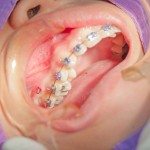
A range of methods have been used to provide orthodontic anchorage, headgear, face masks, chin caps, transpalatal arches, lingual arches or intermaxillary elastics. Recently there has been increased interest in the use of skeletal anchorage devices (implants plates, screws or screw retained devices).
The aim of this review, was to review the effectiveness of miniscrews in reinforcing anchorage during en-masse retraction of anterior teeth.
Methods
Searches were conducted in the Medline/PubMed, Cochrane Database of Systematic Reviews, Cochrane Central Register of Controlled Trials and Scopus databases. Randomised controlled trials (RCTs) comparing mini-screw with other type of orthodontic anchorage and published in English were considered. Two reviewers independently selected studies, extracted data and assessed risk of bias using the Cochrane tool. The primary outcome was anchorage loss. A random effects meta-analysis was conducted.
Results
- 7 RCTs involving a total of 271 patients were included.
- 3 studies were considered to have a low risk of bias and 4 studies a high risk of bias.
- 4 studies compared mini-screws to transpalatal arches, 2 compared min-screws with headgear and one mini-screws with the Nance appliance.
- Data from 241 patients and 6 studies (250 mini-screws and 134 conventional appliances) contributed to the meta-analysis.
- The findings show anchorage loss in favour of mini-screws, Standardised mean difference (SMD) = -2.07 (95%CI; -3.05 to -1.08). This was also seen after the exclusion of high-risk studies SMD = -1.94 (95%CI; -3.46 to -0.42).
- There was limited information on overall treatment duration, space closure duration, quality of treatment, patient-reported outcomes, adverse effects and number of visits.
Conclusions
The authors concluded: –
The result of the meta-analysis suggested that there is moderate quality of evidence that mini-screws are clinically and statistically more effective in preserving orthodontic anchorage than conventional appliances. However, this conclusion is supported by a small number of studies with variable qualities. High-quality RCTs would give a better understanding of mini-screws effectiveness in providing orthodontic anchorage.
Comments
We have previously looked at two reviews on the use of mini-screws for orthodontic anchorage (Dental Elf- 4th May 2017). Both of these earlier reviews suggest that mini-screws are a more effective form of anchorage. This latest review while well conducted does not include any studies published since the last review by Antoszewska-Smith et al (Dental Elf- 4th May 2017). The Antoszewska-Smith et al review includes 4 of the same RCTs as the current review and it is interesting to note that they score the quality of the trials less favourable than the current review which may mean that the characterisation of the overal level of supporting evidence as moderate shoulc be viewed cautiously. So while all three review suggest that min-screws are more effective further high quality, well reported research is needed to confirm this and provide more information on different types of device, effect on treatment duration adverse effects and other patient relevant outcomes as cost effectiveness.
Links
Primary Paper
Fahad Alharbi, Mohammed Almuzian & David Bearn (2019) Anchorage effectiveness of orthodontic miniscrews compared to headgear and transpalatal arches: a systematic review and meta-analysis, Acta Odontologica Scandinavica, 77:2, 88-98, DOI: 10.1080/00016357.2018.1508742
Other references
Dental Elf- 4th May 2017
